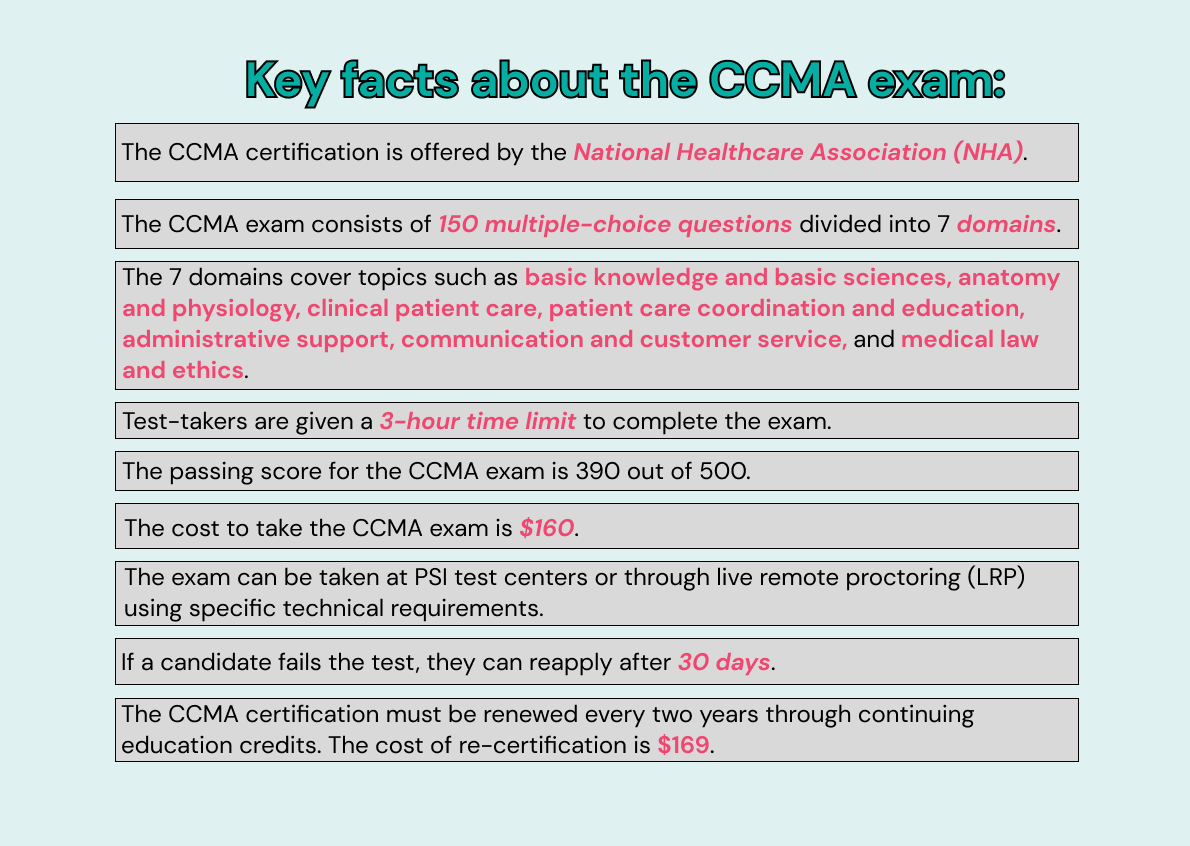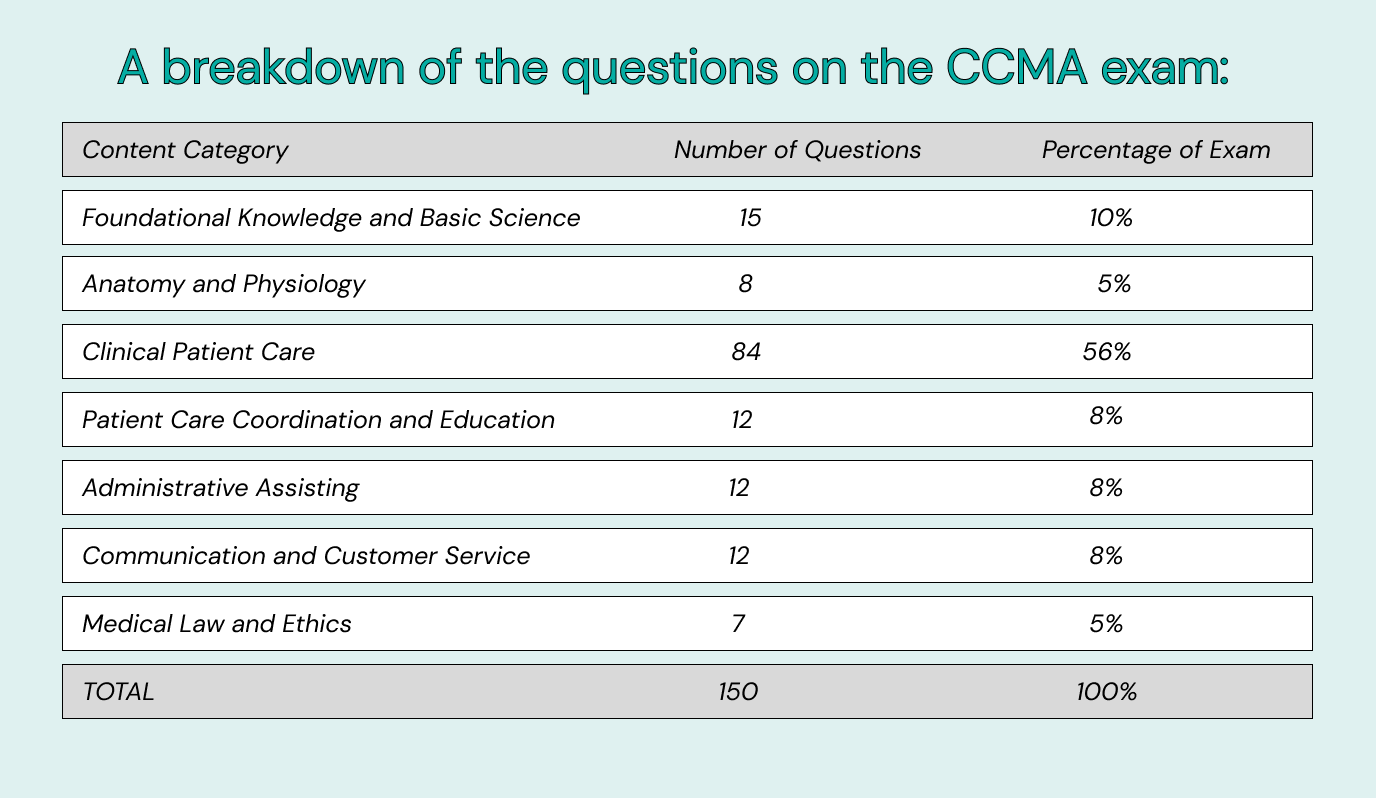As one wise man once said, “People will always need those who will feed, heal, and teach them.” Everything is clear with the first and third points, but the second has nuances. A modern doctor doesn’t work alone but with a medical assistant, preferably with a medical assistant certification. To obtain such a certificate, a person needs to pass the Certified Clinical Medical Assistant (CCMA) exam. To prepare for it properly, a student needs to know what CCMA exam questions there may be and a lot more. If you are wondering what everyone who will try their luck at the Certified Clinical Medical Assistant test should know, you have come to the right place.
Preparing for the CCMA exam can be challenging. If you need assistance with your nursing essays, our nursing essay writing service is here to help.
Continue reading to learn about: |
Understanding the CCMA Exam and Its Structure
The CCMA (Certified Clinical Medical Assistant) test is a standardized exam that measures the knowledge of future medical assistants. This test is administered by the National Healthcare Assistants Association (NHA). It is one of six possible options for obtaining medical assistant certification. We should also note that CCMA has the highest pass rate — 80%. This means that CCMA exam questions are quite easy and understandable for applicants.
The test rates various aspects, such as clinical knowledge, administrative skills, and patient care skills, among others. How many questions are on the CCMA exam? Candidates must answer 180 multiple-choice questions, 30 of which do not count toward the score. They are called pre-test questions and are used to collect information. In general, the examination lasts 2-3 hours. In order for CCMA exam preparation to be successful and bring the desired medical assistant certification, use a specialized CCMA study guide.
To ensure you’re well-prepared for the CCMA exam, consider utilizing our Order an essay service for personalized study materials.
To better understand the structure of the CCMA test, consider the information below:
CCMA Exam Questions: Key Topics Covered in the CCMA Exam
As mentioned earlier, the CCMA test covers seven exam content categories that gauge a wide range of knowledge and practical skills for medical assistants. Each of these categories includes different subjects.
Recommended reads
Analyzing the difficulty of the medical assistant certification test: The main exam content categories
- Basic knowledge and basic sciences. Emphasizes health care systems, medical terminology, basic pharmacology, nutrition, and psychology.
- Anatomy and physiology. Covers body structures, organ systems, pathophysiology, pathological processes, and microbiology.
- Clinical patient care. Covers general patient care, infection control, laboratory procedures, phlebotomy, ECG, and cardiovascular testing.
- Patient care coordination and education. Focuses on preventive medicine, patient transitions, healthcare collaboration, referral processes, reporting technologies, and optimizing patient outcomes.
- Administrative support. Includes diagnostic/procedural codes, scheduling systems, inventory management, authorizations, billing requirements, documentation systems, and telephone etiquette.
- Communication and customer service. Includes effective patient-physician communication, teamwork, customer service management, active listening, communication styles, and email etiquette.
- Medical law and ethics. Covers adherence to codes of ethics, compliance with healthcare legislation, informed consent, medical record keeping, and professional responsibilities.
The CCMA exam consists of how many questions? It consists of 150 questions on various topics concerning medical assistant competence. You can find their full list on the NHA website.
“When I first considered working in healthcare, I thought about the profession of a medical assistant. It is definitely a worthy career. However, in the end, I wanted more of a ‘nursing job’ and chose to become a nurse.”
Cristel Roberts, a nursing student
Quiz: Sample CCMA Exam Questions and Answers
Due to legal and ethical reasons, precise CCMA exam questions and answers cannot be specified. However, we can give you a little guidance and provide possible points that may be there.
Registration and Preparation for the CCMA Exam
To access the CCMA exam, all applicants must go through the exam registration process and preparation stage. As for registration, there is nothing difficult about it. We have collected all the valuable information for you.
Navigating the CCMA exam registration process and costs
Registration for the CCMA exam consists of two stages:
- Stage #1
Everyone who wants to take the test needs to create an online NHA account. Next, the candidate must choose the CCMA exam option, answer the clarifying questions, and upload the documents confirming their right to participate in testing. This way, the NHA can make sure that the person is eligible to sit for the medical assistant certification examination.
- Stage #2
After receiving approval to complete the test, the applicant can choose their exam date and location. A person can complete the CCMA exam at PSI test centers across the country or via live remote proctoring (LRP). After that, the test-taker must pay a fee of $160. It is possible to pay for the test by credit or debit cards.
IMPORTANT! If you plan to take the CCMA exam online, make sure your equipment meets the requirements: a computer/laptop with Windows 7 or Mac OS X, a Google Chrome browser, a webcam, a microphone, a stable internet connection, sufficient memory, and free space for testing.
How to prepare for the medical assistant certification exam using the CCMA study guide
When choosing a learning manual with CCMA exam questions, you can consider several options that applicants most often prefer:
- The NHA CCMA Certification Study Guide is directly developed by the National Healthcare Administrators Association (NHA), the exam administering body. It follows the content of the exam and offers in-depth coverage of the material with practice questions.
- Kaplan’s Medical Assistant Exam Review provides comprehensive coverage of medical assistant concepts, including clinical and administrative topics. It includes practice exams and online resources for interactive learning.
- Elsevier’s Medical Assistant Exam Review offers CCMA exam questions with explanations and illustrations. It is highly regarded for its thoroughness and suitability for visually impaired students.
Follow the simple tips below to benefit from the CCMA study guide and ensure you’ll have a well-rounded CCMA exam preparation:
- How many questions is the CCMA exam? The study guide outlines 150 CCMA exam questions divided into seven categories. Take time to familiarize yourself with the test structure and the topics covered by these questions for quality CCMA exam preparation.
- Use the CCMA practice questions provided in the manual to test your knowledge. This will help you gauge your understanding of the material and the examination format.
- You can combine the CCMA study guide with other resources such as textbooks, online materials, and review courses to prepare for the test thoroughly.
“Review different study guides to prepare for the medical assistant certification test. This way, you can understand which option is right for you. However, the most promising alternative is the NHA CCMA Certification Study Guide, in my opinion.”
Victoria Davis, TOP-writer at Customwritings.com, Healthcare and Life Science department
CCMA exam scoring and passing criteria are the following: You must receive 390 scores out of 500 to pass the exam successfully.
Effective Study Strategies for CCMA Exam Preparation
Armed with valuable information about the categories of medical assistant competencies in the CCMA exam, the topics covered therein, and the possible options for study guides, it’s time to learn some tips on how to prepare for the test effectively.
Essential tips for CCMA exam preparation you should know:
- Understand the format of the exam. Review the structure of the test, including the number of CCMA exam questions, time limits, and question types.
- Use reliable resources. Choose a reliable CCMA study guide, textbooks, online courses, and practice exams from reputable sources.
- Create a study plan. Organize your study routine so that you get enough attention for each area of the examination. Be sure to set aside time to revise the material that is most difficult for you.
- Practice regularly. Take practice tests to gauge your understanding and pinpoint any areas that need improvement.
- Review the key concepts. Focus on fundamental medical knowledge, procedures, laws, ethics, and communication skills.
- Model the exam environment. Practice under conditions similar to the actual CCMA exam, such as limited time and no distractions.

CCMA exam questions: Why is continuing education for CCMA certification important?
After obtaining medical assistant certification, specialists must undergo recertification every two years thereafter. In addition, certificate holders must earn 10 NHA continuing education credits. That is why continuing education for CCMA is undoubtedly important after passing the CCMA exam. It ensures that medical assistants will be able to renew their certificates and continue to perform well in line with the regularly updated requirements.
Top 5 CCMA Exam FAQs
What is the CCMA exam structure?
The CCMA exam is structured into the following main areas:
- Basic knowledge and sciences
- Anatomy and physiology
- Clinical care of patients
- Patient care coordination and education
- Administrative support
- Communication and customer service
- Medical law and ethics
These areas ensure medical assistants are well rounded professionals.
How do I prepare for the CCMA exam?
Preparation requires a study plan. Start by familiarising yourself with the 7 domains of the exam. Use official study guides and practice tests to test your knowledge. Address your weak areas, review regularly and if needed get guidance from certified professionals or join a study group for extra support.
What kind of questions are on the CCMA exam?
Common questions are practical and theoretical. For example:
- Body structure: Major body systems.
- Clinical procedures: Instruments and patient care protocols.
- Medical law and ethics: Informed consent and patient rights.
Also patient communication, care coordination and billing codes.
How long is the CCMA exam and what is the pass mark?
The exam has 150 scored questions and 30 unscored pretest questions and is 2 hours long. You need to score 390 out of 500 to pass.
What to use to prepare for the CCMA exam?
Use:
- NHA CCMA Study Guide
- Kaplan Medical Assistant Exam Review
- Online practice tests
And online forums and study groups for extra help.






